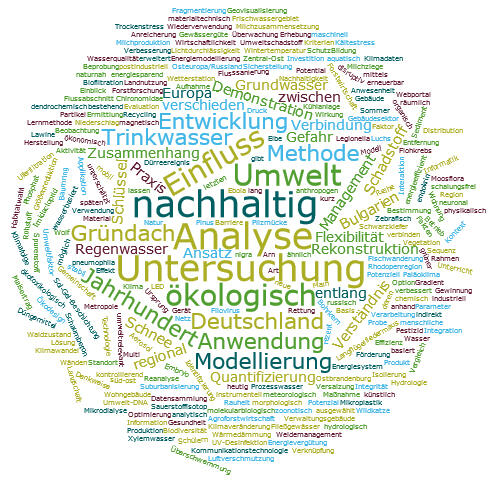03.03.2022 | “The DBU stands alongside Ukraine and expands its fellowship program”
Bonde: We are offering 30 additional scholarships
Osnabrück. In response to Russia’s war of aggression against Ukraine, the German Federal Environmental Foundation (DBU) – as one of Europe’s largest environmental foundations – is sending out a message of solidarity with Ukraine. To support young scientists in Central and Eastern Europe (CEE) in environmental protection and nature conservation, the ongoing DBU Fellowship Program is being expanded. Ukrainian college graduates and PhD students will now receive special support. DBU Secretary General Alexander Bonde: “The DBU stands alongside Ukraine in these traumatic times. For academics living there or for those who have fled the country, we are offering 30 additional scholarships through our CEE Fellowship Program to support young scientists.” For the latest information, see https://www.dbu.de/@MOEFellowshipUkraine
CEE Fellowship Program is being stepped up for Ukraine
This is to be a “comprehensive set of measures”, according to Bonde. The CEE fellowships awarded by the DBU every year will therefore now include 30 additional scholarships offered to Ukrainian academics. “The funding will benefit college graduates and PhD students living in Ukraine or those who have had to flee the country due to the war,” the DBU Secretary General says. The aid is aimed at the entire range of young scientists — “from natural to social sciences”. Bonde: “Our goal is to enable young people to acquire further qualifications and thus deliver solutions to challenges relating to environmental protection and nature conservation in their home countries.”
Research stays of six to twelve months at German host institutions
The DBU CEE Fellowship special program for Ukraine enables young Ukrainian scientists to spend six to twelve months at German host institutions. This includes universities, research institutes, environmental and nature conservation bodies, associations, and non-governmental organizations. In addition to graduates with a Master’s degree, PhD students are also eligible to apply. The candidates should have attained good or excellent results in their studies, which should be within the last five years. Applications are submitted as part of an online process, with each candidacy based on a project idea relating to environmental protection or nature conservation. Applications can be submitted immediately and there is no deadline as of yet. Anybody who has questions can contact the head of division at the DBU responsible for the CEE Fellowship Program, Dr. Nicole Freyer-Wille, at n.freyer@dbu.de or by phone on +49-541-9633-460. The German Federal Environmental Foundation, based in Osnabrück, will also adjust the CEE Fellowship Program with a view to the Russian province of Kaliningrad in line with the approach of the German Academic Exchange Service (DAAD), the German Alliance of Science Organizations, and other foundations: No new projects will be funded there until further notice.
DBU head of division encourages young CEE fellows in Germany and Ukraine
The DBU has been awarding CEE fellowships in Central and Eastern Europe since 1996. This typically involves around 60 fellowships per year, with a total funding of around 1.1 million euros. The special program now launched by the DBU for Ukraine will not only help the 30 new applicants, but will also benefit the 15 alumni living in Ukraine who have already completed a period of research in Germany, as well as three fellows currently working in Germany. “From the outset, our goal has been to enable young scientists to spend time conducting research and further education at renowned German institutions — so that they can contribute to the advancement of environmental as well as climate protection, and nature conservation in their home countries,” says Freyer-Wille. She has been looking after the needs of alumni and fellows for almost 20 years — including now in times of war. “Whenever possible, I keep in touch with the young people in Germany and Ukraine and try to give them encouragement. They are grateful for the additional support from the DBU,” she says. The mood among the young people is “fluctuating between shock, incomprehension, and despair”. Freyer-Wille: “They can’t understand how bombs can be devastating everything in their country, with cultural treasures being destroyed and people dying.” She is also in contact with one of the alumni who had traveled from Germany to visit his mother in Ukraine — and who is now unable to leave the country following the outbreak of war.


